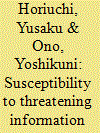| Srl | Item |
| 1 |
ID:
126824


|
|
|
|
|
| Publication |
2014.
|
| Summary/Abstract |
This paper attempts to explore the strategies for breaking the deadlock between the demand for resolving climate crisis and the resistance to deploying nuclear power. Since our present renewable technology is not advanced enough to replace fossil fuel power plants, nuclear power becomes the only available means that can buy us more time to explore better energy sources for coping with the dilemma of global warming and energy security. Therefore, this paper proposes an elaborated fear appeal framework that may shed light on the intervention points for mitigating fear. By examining the influence of fear appeal on the nuclear issue, three strategies for demarketing the nuclear fear of the public are recommended. The paper concludes that only when energy policy makers and the nuclear industry recognize the significance of minimizing fear and begin to work on removing the sources of fear, can we then expect to bring the nuclear issue back to rational discourse.
|
|
|
|
|
|
|
|
|
|
|
|
|
|
|
|
| 2 |
ID:
190882


|
|
|
|
|
| Summary/Abstract |
A growing number of news articles and politicians’ statements treat refugees as potential terrorists. However, existing research has yet to thoroughly examine how threatening information about refugees affects natives’ attitudes toward refugee resettlement. To address this issue, we conducted a survey experiment in Japan, where the number of refugees accepted each year is extremely small, despite the rapid increase in news about refugees. Our results show that opposition to refugee resettlement is associated with its proximity. Specifically, we find two types of NIMBY (not-in-my-backyard) attitudes – within-country and between-country NIMBY-ism – toward refugee resettlement among Japanese people. Additionally, respondents become more strongly opposed to refugee resettlement when exposed to threatening frames that depict refugees as harmful, regardless of the proximity to threats and potential resettlement. These findings add nuance to the scholarly literature on threat perceptions and public attitudes in intergroup relations. First, our findings suggest that NIMBY attitudes toward refugee resettlement (shown in Ferwerda, Flynn & Horiuchi, 2017) are not a US-only phenomenon. Second, we provide empirical evidence to support the theory that subjectively perceived threats affect people’s hostility toward out-group members, even in the absence of actual threats. Finally, we contribute to the recent debate on the effects of proximity to threats. Our results support the argument that the psychological effects of terrorism on negative attitudes toward immigrants and refugees are more pronounced in homogeneous societies, irrespective of proximity to the threat.
|
|
|
|
|
|
|
|
|
|
|
|
|
|
|
|